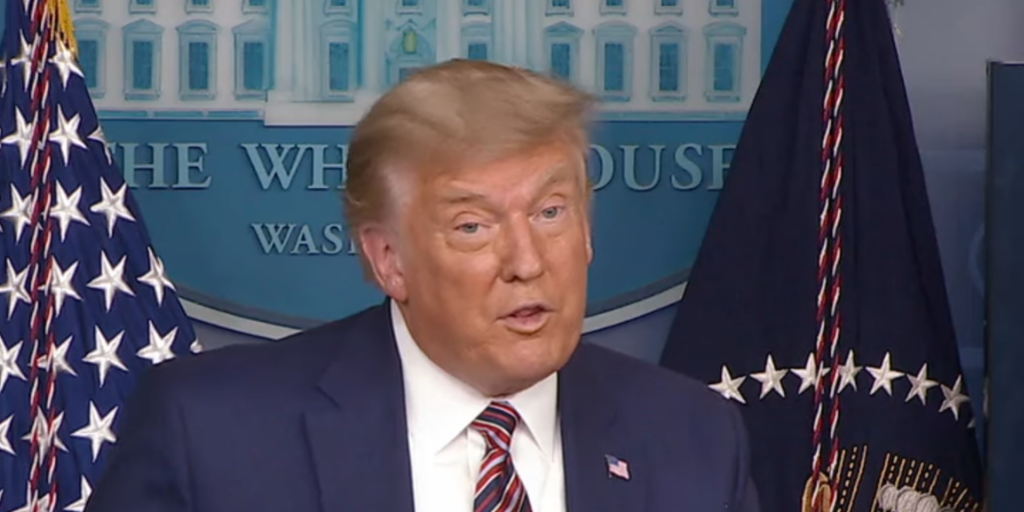
President Trump this afternoon announced two drug pricing rules with implications for the 340B program, and said his administration “in a few weeks” will finalize finalize regulations to require federally qualified health centers (FQHCs) to pass along 340B drug discounts on insulin and injectable epinephrine directly to patients. | Source: White House YouTube channel.
Trump Issues Drug Pricing Rules That Impact 340B; Says 340B Health Center Final Rule Is Coming
Medicare-participating 340B hospital outpatient departments will have to take part in the Trump administration’s “most favored nation” (MFN) payment test for Medicare Part B drugs, the U.S. Health and Human Services Department announced late today.
“To the extent these entities receive payment under the model that is lower than their current Medicare payment, there may be fewer resources available for their 340B program activities,” the Centers for Medicare & Medicaid Services (CMS) acknowledged in an interim final rule posted for public inspection this afternoon. The rule takes effect Jan. 1, 2021. CMS is accepting public comments; the deadline is 5 p.m. on Jan. 26, 2021.
The Biden administration is likely to scrap the rule when it takes office but might pursue other ways to let Medicare negotiate drug prices.
Under the MFN rule, starting next year for the 50 drugs that Part B spends the most on, CMS will pay no more “than the lowest price that drug manufacturers receive in other similar countries,” plus a flat add-on instead of a percentage of the drug’s cost. Currently, 340B hospitals are paid at a rate of average sales price (ASP) minus 22.5 percent for such drugs, and CMS will soon publish a rule in which it might lower reimbursement to an ASP minus 28.7 percent effective rate. CMS will phase-in the new MFN payment rate over four years.
CMS said, “MFN participants that are 340B covered entities may need to enhance their direct contracting with manufacturers in order to obtain MFN Model drugs within the MFN Drug Payment Amount.”
Other Final Rule Stops PBM and Part D Plan Rebates
The administration late today also announced an HHS Office of Inspector General (OIG) final rule preventing drug manufacturers from offering rebates to pharmacy benefit managers (PBMs) and Medicare Part D plans. The final rule also gives manufacturers protection under the Anti-Kickback Statute for drug price reductions to patients at point of sale, and for fixed-fee services arrangements between manufacturers and PBMs—such as “services for manufacturers to prevent duplicate discounts on 340B claims,” according to the rule’s preamble.
The rebate rule does not apply to Medicaid managed care organizations, as would have been the case under the administration’s proposed rule. In the rule’s preamble, CMS rejected a commenter’s recommendation that OIG should develop guidance for how to identify and avoid duplication of 340B drug discounts and the newly authorized manufacturer point-of-sale drug price reductions for Part D beneficiaries. Establishing mechanisms for avoiding duplicate discounts is outside the scope of the rule, OIG said.
The rebate final rule takes effect Jan. 1. The rule is also likely to be scrapped soon after the Biden administration takes over on Jan. 20.
Stakeholder Reactions
The MFN rule is already receiving significant pushback from the drug industry, which has threatened to sue to block the regulation. It is also likely to be panned by hospital groups and other cancer care providers. 340B Health and other hospital groups raised significant concerns about the proposed MFN rule and will likely be even more concerned with the final version.
Regarding the MFN pricing test rule, Pharmaceutical Research and Manufacturing of America (PhRMA) said it “is considering all options to stop this unlawful onslaught on medical progress and maintain our ability to win the fight against COVID-19.”
PhRMA said it is “still reviewing the finalized rebate rule, but we are hopeful it will guarantee that seniors will finally see the savings at the pharmacy counter from discounts their health plans negotiate with biopharmaceutical companies.”
Pharmaceutical Care Management Association (PCMA), the PBM trade association, said the rebate rule “will drastically increase Medicare Part D beneficiary premiums and taxpayer costs.”
“PCMA will explore all possible litigation options to stop the rule from taking effect and destabilizing the Medicare Part D program that millions of beneficiaries rely on,” the group said. PCMA did not address the MFN rule in its statement.
340B Health Center Rule Coming “In a Few Weeks”
During a White House press briefing this afternoon to announce the two drug pricing rules, President Trump said his administration “in a few weeks” will finalize regulations to require federally qualified health centers (FQHCs) to pass along 340B drug discounts on insulin and injectable epinephrine directly to patients.
Comments on the 340B proposed rule were due Oct. 28. The National Association of Community Health Centers (NACHC), state primary care associations, and local FQHCs implored the administration not to implement the rule, saying it is based on misunderstanding of how FQHCs and 340B work, and would do more harm than good.
The Biden administration likely will push back a final rule’s effective date, as a prelude to deciding whether to implement or withdraw the rule. Or it could scrap the rule altogether when the administration takes office.
Next week, the Trump administration is expected to release its calendar year 2021 hospital Outpatient Prospective Payment System (OPPS) final rule, in which it will announce whether it will keep hospitals’ Part B reimbursement for 340B-purchased drugs at this year’s level (ASP minus 22.5 percent) or cut it even further to an effective ASP minus 28.7 percent. The rate in 2017 was ASP plus 6 percent.
Stakeholders also are awaiting the Trump administration’s 340B binding administrative dispute resolution final rule. The White House Office of Management and Budget is reviewing it now.
We will report more on these drug pricing rules as well as the potential for additional drug pricing action by the administration in our Tuesday Nov. 24 edition.

